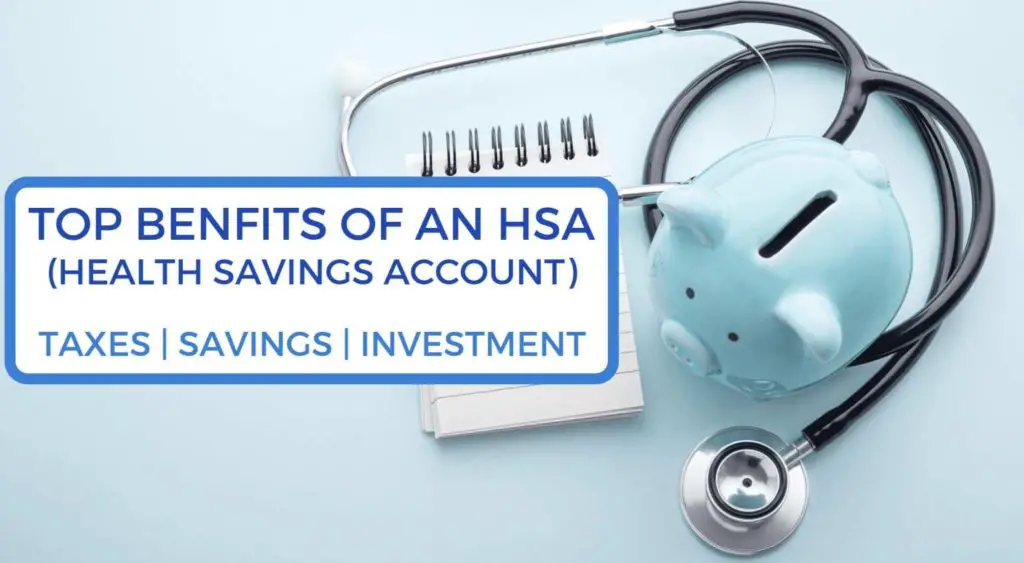This post may contain affiliate links, which means I’ll receive a commission if you purchase through my links, at no extra cost to you. Please read full disclosure for more information.
WHAT IS AN HSA (HEALTH SAVINGS ACCOUNT)?
A Health Savings Account, or HSA, is a tax-advantaged account that was created for individuals to save and pay for qualified medical expenses out of pocket. These accounts are designed for those covered by high-deductible health plans (HDHPs).
The primary attraction to a health savings account is the triple tax benefit. With an HSA, you can make contributions with pre-tax money, your funds can grow tax-free, and your withdrawals for qualified medical expenses are tax-free. The goal of these benefits is to lower an individual’s overall health care costs.
There are ways to extract even more value out of an HSA, which we will get into deeper in the post.
Although the HSA sounds like a no-brainer, not everyone can, or should, sign up for this account. An HSA may make sense to some, but not to others. Additionally, certain qualifications need to be met to open an HSA.
HOW AN HSA WORKS?
An HSA works much like other retirement accounts. You, your employer, or someone else can make contributions towards your account. Like an IRA or 401k, there is an annual contribution limit.
With your HSA funded, you’ll receive a debit card and/or checks that link to your HSA account. You’ll use those funds to pay for qualified medical expenses that your HDHP does not cover.
At the end of each year, whatever funds have not been used for medical expenses will roll over into the next year. This is an attractive feature when comparing it to an FSA.
A Flexible Spending Account (FSA), which is another account used for healthcare costs, requires you to spend all your funds in the same year. The leftover funds do not roll over.
Once you are over 65 and enrolled in Medicare, you will no longer be able to contribute to your HSA. However, you will still be able to use the funds for medical expenses tax-free.
Additionally, after 65 your HSA will essentially act like another IRA. You will be able to use the funds as you please without penalty. This is one reason why an HSA is not only used for medical expenses, but for retirement as well.
Contribution Limits: 2020 and 2021
TOP BENEFITS OF AN HSA

Let’s get into the benefits of a health savings account. The first benefit will group all the attractive features of the account itself. The second will discuss the tax benefits and the third will show the savings and investment potential.
1. Account Features
Flexibility and utility – There are a wide range of medical expenses that qualify for use of HSA funds. With your debit card and checks, you can immediately pay for medical expenses, prescriptions, etc.
Contributions – You, your employer, or someone else can all contribute towards your HSA up to the annual contribution limit.
Lower deductibles – To open an HSA, you have to be enrolled in an HDHP. These high-deductible plans have much lower premiums than low-deductible plans. You’ll be able to enjoy a lower monthly payment.
Rollover – Funds you don’t use will roll over into the next year. So if you didn’t have many trips to the doctor this year, you don’t need to worry about wasted funds. Simply use them in the future.
2. Triple Tax Benefits
The health savings account is the most tax-advantaged account you can use. With the high healthcare costs in the U.S. these tax benefits hope to curb your expenses as much as possible.
1. Tax-free contributions – If you contribute through your employer, your contributions will be with pre-tax money. If you open up your own account, your contributions will be deductible against your taxable income. Either scenario results in tax-free contributions.
2. Tax-free account growth – Your HSA is free to grow through interest and appreciation without any tax liability generated. Your HSA funds can be stored as a savings account that generates interest. A more effective route is investing your HSA in mutual funds, ETFs, stocks, and other investment vehicles.
3. Tax-free withdrawals – Finally, your withdrawals will be tax-free as long as you abide by a few rules. Your withdrawals under age 65 will only be tax-free if used for qualifying medical expenses. If you use funds for anything else, you’ll pay income taxes and a 20% penalty. Once you reach age 65, the 20% penalty no longer exists and you can use your HSA as if it were an IRA.

3. Savings and Investment Potential
Many look at the HSA as a savings and investment tool for retirement rather than a fund for medical expenses. Although the primary purpose of the HSA is for individuals to pay for medical expenses, it can be beneficial to never touch your HSA and use it as a retirement vehicle.
You aren’t required to take distributions at any point in your life, so you can allow your contributions and appreciation to compound until retirement. Think of your HSA like a 401(k) or IRA.
A strategy could look like this:
- Maximize your contributions to your HSA each year.
- Invest your HSA into safe, low-cost funds.
- Pay any medical expenses out of pocket and not with your HSA funds.
- Allow your account to compound until retirement.
- At age 65, continue to let your account grow, or use the funds as you please.
Whether before or after the age 65, withdrawals for qualified medical expenses will be tax-free. However, if you withdraw funds after 65 for uses other than qualified medical expenses, you’ll pay taxes on that amount, similar to a traditional IRA.
SHOULD YOU OPEN AN HSA?
After reading everything up to this point, you may be asking yourself if you should open an HSA. The HSA is packed with benefits, but they aren’t ideal for everyone. First, you need to make sure you are eligible for the account.
HSA Eligibility
Here are a few boxes you need to check in order to open an HSA:
- Must be 18 years or older
- You can’t be claimed as a dependent on someone else’s taxes
- You are not covered under Medicare or any other insurance plan
- You are enrolled in an HDHP
Does It Make Sense For You?
To decide if an HSA makes sense for you, first think about your health insurance options. Are you going to choose a low-deductible plan or a high-deductible plan. Don’t choose the high-deductible plan only so you can qualify to open an HSA. Choose the health insurance that makes sense for you personally.
If you go to the doctor frequently, have medical conditions, and require prescriptions, you may want to choose a low-deductible health plan. If you are fairly healthy and don’t visit the doctor that often, a high-deductible plan may suit you better.
When making an important decision for your healthcare and your finances, it helps to speak to a professional. You can Google healthcare counselors in your area that can offer guidance.
HOW TO OPEN AN HSA
If you have health insurance through your employer, you can ask your provider if they partner with institutions that offer an HSA. If you are self-employed or choose not to use your employer’s insurance, you can search online to compare different HSA providers. Then, it’s as simple as submitting an application.
Before you do, you’ll want to take a few things into consideration when choosing between providers. Like all investment or retirement accounts, you’ll want to analyze the features and fees of the HSA options.
If you are using your HSA as an investment tool, be sure that your provider allows for the flexibility to invest in credible, low-cost funds. If you are using your HSA primarily for medical expenses, look for a provider that offers convenience and reliability.
Overall, just take time to research so you choose a provider that suits your needs.
DRAWBACKS OF AN HSA

Must have HDHP
The biggest obstacle in opening an HSA is the high-deductible health plan requirement. Like we mentioned, you shouldn’t sign up for an HDHP solely to open a health savings account. If you sign up for an HDHP when you really should be on a low-deductible plan, you could potentially cause more financial harm than good.
Tough decision to use funds or not
Once you have an HSA open, you may be torn on the decision to tap into those funds. You can use your HSA to pay for qualified medical expenses or you can allow your account to grow until retirement.
This decision will be tough based on your needs, financial situation, and long-term goals. If you are strapped for cash and have medical bills to pay, you may have no other option than to use your HSA.
Strict withdrawal rules
The withdrawal rules for a health savings account are strict. Your withdrawals will only be tax-free if used for qualifying medical expenses. If you use HSA funds for anything else before 65, you’ll owe income taxes and have to pay a 20% penalty.
At age 65, your withdrawals for qualified medical expenses will still be tax-free. For withdrawals for other uses at 65 and older, you will owe income taxes, but will no longer be subject to the 20% penalty.
Hassle of tracking and recordkeeping
In order to prove your medical expenses are qualified, you will have to track and record your receipts. If you aren’t on top of this and forget about certain expenses, you may not receive credit for all qualified expenses you paid. Or, if you claimed qualified medical expenses, but can’t show proof, you could find yourself in an audit with the IRS.
SUMMARY
The health savings account is an underutilized account that is packed with benefits. You can use your HSA to help reduce your medical expenses or you can take advantage of its triple-tax benefits and investment potential.
Before you jump to open an account, do some research, speak to a healthcare counselor, and find out if an HDHP and HSA are good options for you.



